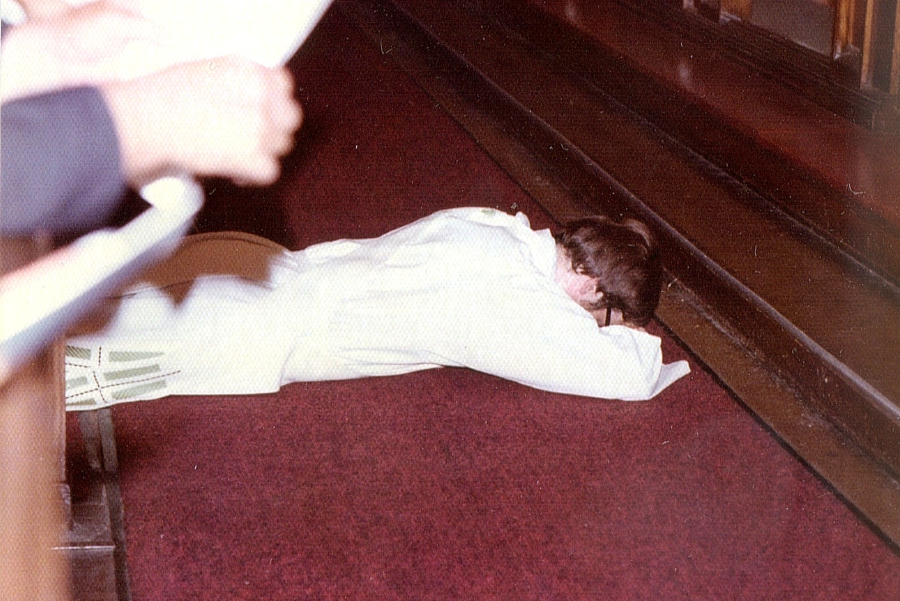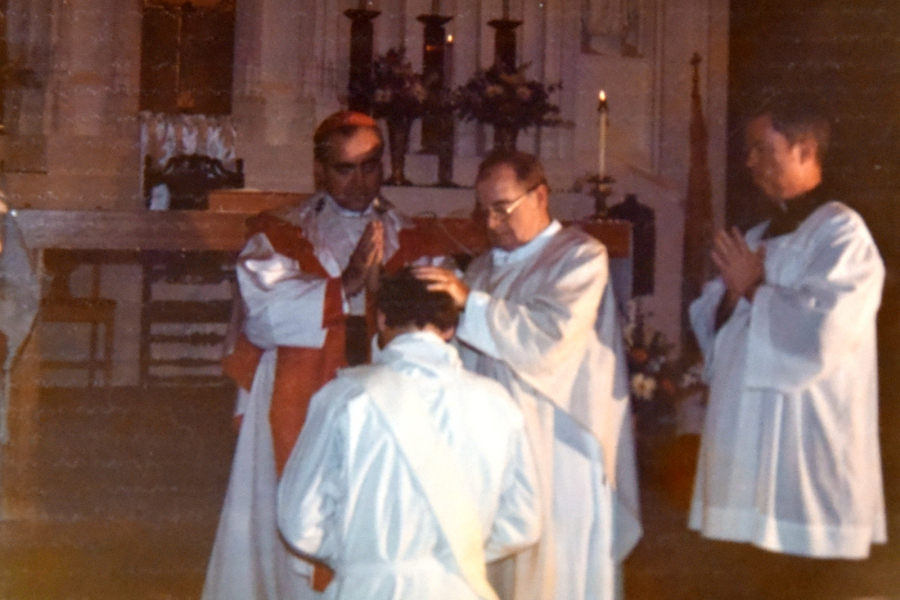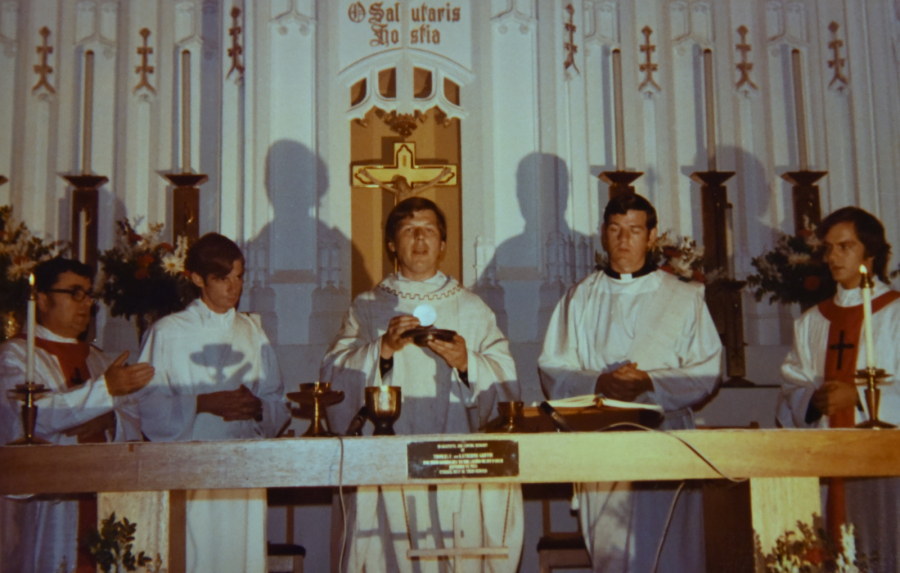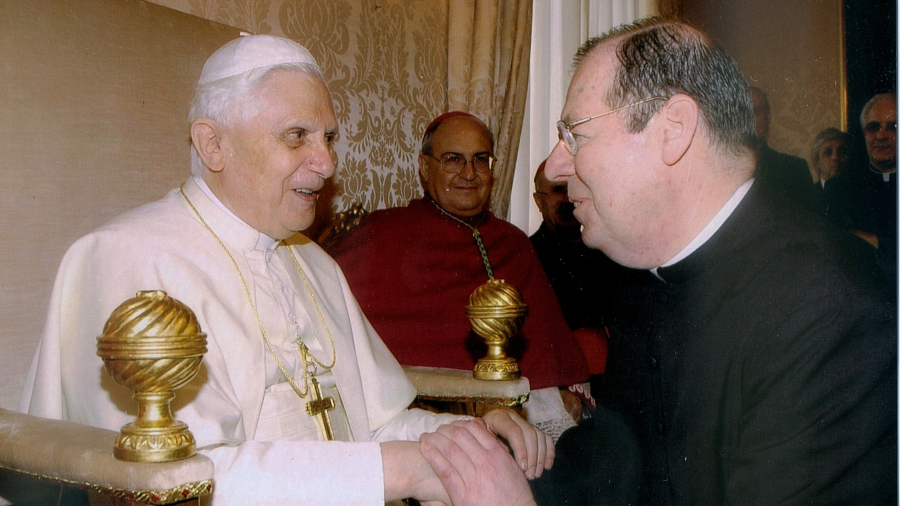Celebrating 50 Years of Ordination to Priesthood
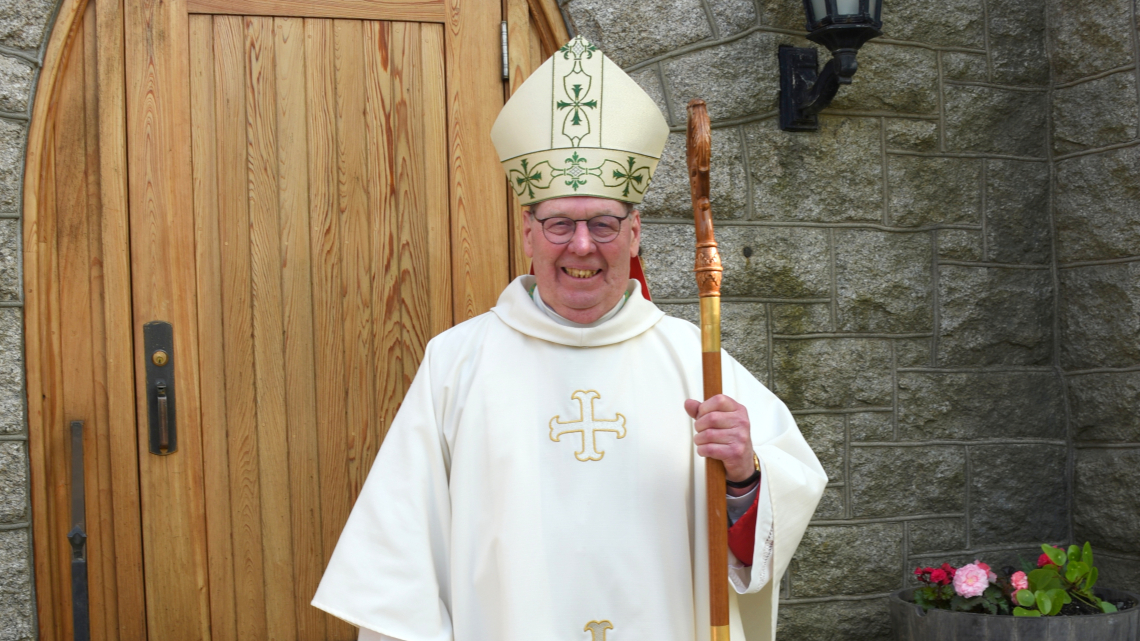
Throughout his 50 years as a priest, Bishop Robert Deeley has had a lot of noteworthy accomplishments. In addition to leading the Diocese of Portland since 2014, he served as an auxiliary bishop in the Archdiocese of Boston, served for seven years at the Vatican, has been on the Board of Trustees of three seminaries, and has been president of the Canon Law Society of America. But when asked to reflect on his half century of priestly service, he cites none of those prestigious positions or the many others he has held. Rather, he points to something he has done thousands of times during his life.
“The most spectacular moment of everything is the ability to celebrate the Eucharist. There is nothing more profound than the Mass, that God would give us the gift of His Son, and His Son would give Himself for us. We celebrate that in the sacrifice of the Mass, and in that act, He becomes present to us again. What could be greater than that? It’s like I say to the kids when I’m celebrating first Communion, ‘Isn’t this great?’ It is!” the bishop says. “God is with us, and that is what we celebrate in the Mass. So, there can’t be anything more profound than that.”
Bishop Deeley has been leading congregations in the celebration of the Eucharist since July 14, 1973. That is when he was ordained to the priesthood by Humberto Cardinal Medeiros, then-Archbishop of Boston.
“The whole thing to me was just so gratifying, that finally, after years of preparation, I was going to be ordained, and I was going to be able to begin my ministry,” the bishop says.
Raised in Belmont, Massachusetts, he was ordained in Sacred Heart Church in the neighboring town of Watertown. He says what he remembers most about the day was just how hot it was.
“You could see the sweat pouring down,” the bishop recalls.
His ordination took place at the same church where he was baptized, made his first Communion, and was confirmed. He says the parish was the center of his family’s life.
“That really was the way we lived our lives,” he says. “My mother and father’s social life would have been around the church. My mother would go to sodality events. My father would go to Holy Name Society events.”
His parents brought their strong Catholic faith with them from County Galway, Ireland, from which they both emigrated, coming to the United States in search of opportunities not available to them in their homeland. The bishop says his parents’ faith is what carried them through the tough times.
“My mother’s devotion to the Rosary was what kept her going and helped her all her life. There were five boys and five mysteries of the Rosary,” he says. “Even when my mother was in the nursing home, she continued to pray the Rosary.”
Bishop Deeley says he first felt the sense of a priestly vocation when he was just four or five years old. He says when they were very young, his parents didn’t take him and his younger brother to Mass, waiting perhaps until they knew the pair would behave. He says, however, that his mother would always stop at the church with them while walking to the grocery store, and one day, it was while daily Mass was being celebrated.
“I can remember being in the church and the priest saying Mass, and I can remember being fascinated by it,” he says.
In addition to his parents, he says there were many positive influences in his early life, including the Sisters of St. Joseph, who were his Catholic school teachers, and most especially Father (later Msgr.) John Keilty, whom he came to know after becoming an altar server in the fourth grade.
“He was just the greatest priest. He was so kind and so good, and I thought it would be nice to have a life like his,” says Bishop Deeley. “It was seeing the goodness that he was able to accomplish. It wasn’t just his kindness, but it really was the result of that kindness and the way he related to people.”
The bishop says he and his friends would often stop by the rectory to chat with Father Keilty.
“All of us would go down and we would ring the doorbell and say, ‘Is Father Keilty home?’ And he would sit there for an hour with us talking, just about life and what was happening in the world,” the bishop recalls.
The bishop says he had an active social life during high school, but the thought of the priesthood still kept rolling around in the back of his head. And then, one day, Father Keilty asked him about it.
“I was probably a junior in high school at the time, and he said to me, ‘Have you ever thought about the priesthood?’ And I said, ‘Yes, I have.’ And he said, ‘Well, we should talk more about it.’”
In 1964, he entered Cardinal O’Connell Minor Seminary in Jamaica Plain and then, after two years there, received a Theodore Basselin Fellowship to study philosophy at The Catholic University of America in Washington, D.C. He says it was a tumultuous and confusing time because of the upheaval surrounding the Vietnam War, but he never considered leaving seminary.
“I never really thought I would leave because I still thought the priesthood was something worthwhile,” he says. “For me, the message of the Gospel is such a message of hope that I can’t imagine not being able to preach it.”
Bishop Deeley says he feels as strongly about that now as he did back in the mid-1960s.
“I really believe the Gospel is the greatest thing going because in it is the hope that the Lord gives us. The Gospel tells us that Jesus rose from the dead, and everything else is seen in that light. What could be more hopeful than that? That says it all. It is absolutely the answer that gives meaning to life as far as I’m concerned. Everything falls from that. If you believe the message of the Gospel, it gives meaning to your life, and it also calls you to live in a certain way,” he says. “It is to live as Jesus called us to live, which is to care for each other. Care for each other doesn’t only mean feeding people or providing things for them. It’s also about providing meaning for them. The food that we need is not just the food that we eat. It is also the food that provides meaning to our lives, and that food is the Gospel. A diocesan priest does both. We preach, and yet, we help folks to do works of charity.”
The bishop says, however, that priesthood is just one way of living out the Gospel message.
“The gift is faith. Once you understand the gift of faith, then there are all kinds of vocations. My parents faithfully lived out their vocation to marriage. They couldn’t afford to get married when they were younger, so they got married older, and they still had five children. My mother was 40 when I was born and 42 when my brother Kevin was born, so there was generosity in their marriage, which was a response to their vocation. I was born out of that generosity,” he says.
After earning a bachelor’s degree in philosophy from The Catholic University of America, the bishop continued his studies at the Jesuit-run Pontifical Gregorian University in Rome, Italy, receiving a degree in theology.
He was ordained to the priesthood just weeks after returning home. His initial assignment was as an associate pastor of St. Bartholomew Parish in Needham. It would be his second assignment, however, that would shift the course of his future ministry. Interested in the law since he was a boy, he became secretary to the Metropolitan Tribunal of the Archdiocese of Boston. A tribunal handles cases that fall under the Code of Canon Law, most frequently marriage annulments.
“I went there not really knowing an awful lot about the Church’s law other than what I had studied in seminary, but I became fascinated with it all,” he says. “It was a tremendous service that we were doing for people, helping them to return to the sacraments.”
His interest in the law of the Church would take him back to the Pontifical Gregorian University, where his studies would lead to a doctorate in canon law.
He returned to the tribunal, eventually becoming judicial vicar. He describes it as a very rich experience, but after 14 years there, he asked to return to parish work and was named pastor of St. Ann Parish in the Wollaston section of Quincy.
Even though it was during this time that cases of clergy sexual abuse came to light, the bishop says he still treasures his time at St. Ann because of the caring community there.
“Being in a parish with people, helping them to cope with this, having them help me cope with this, was a perfect example of a Christian community at work,” he says.
The bishop describes the revelations of clergy sexual abuse as the low point of his 50 years of ministry.
“It was just so hard on everybody, realizing the enormity of the evil involved and just being heartsick about it, knowing the pain that it caused the victims first of all but, also, the wound that it was to the Church and still is,” he says.
The revelations of clergy sexual abuse led to then-Msgr. Deeley’s next assignment. He was one of two priests chosen by the American bishops to go to the Vatican to assist the Congregation for the Doctrine of the Faith in investigating cases from the United States.
“It was awful work dealing with these cases, so negative and so sad and so evil,” the bishop says. “But I worked with people who were very faithful and faith-filled, and we supported each other.”
The assignment also gave him the opportunity to work with Cardinal Joseph Ratzinger, who was prefect of the congregation at the time.
“He was a genius and one of the kindest men I have ever met, just a really fine person,” the bishop says.
The position was supposed to be temporary, but Bishop Deeley says Cardinal Ratzinger, who would soon become Pope Benedict XVI, wanted him to stay on. He ended up serving there for seven years.
Upon his return to the Archdiocese of Boston, Msgr. Deeley served as vicar general and moderator of the curia, and in November 2012, Pope Benedict named him an auxiliary bishop. When he was ordained a bishop on January 4, 2013, he chose as his episcopal motto Veritatem Facere in Caritate, which he translates as “living the truth in love.”
“St. Paul in Ephesians speaks of living the truth in love, which means you don’t beat someone up, but you are helping them to understand that there is a fullness of life that living Jesus’ way will bring,” he says. “I think in our world today, truth seems to be transactional and variable. People will talk about ‘my truth.’ There is no such thing. Truth for us as Christians is the Gospel and is Jesus Christ. So, how does He ask us to live it? To say veritatem facere in caritate is to say that we work at it, that it’s a process. I like the participial nature of that verb facere, doing the truth in love, living the truth in love, being the truth in love. All of that is contained in that one word.”
Just over a year after his episcopal ordination, Bishop Deeley was chosen by Pope Francis to be the 12th Bishop of Portland. He laughs when he remembers missing the call because he was working out at the gym.
“I had just gotten ready to go and exercise, and I said, ‘I’m not going to answer it. I don’t care who it is,’” he says. “When I got home, I said, ‘I should check to see if there is a message,’ and it was the nuncio saying, ‘Bishop Deeley, I need to talk with you. Please call me in the morning.’ So, I blew that one.”
He says when the apostolic nuncio asked him if he needed time to think about accepting his new assignment, he said no. If the Holy Father wanted him to take the job, he was ready to do it.
“When you live the priesthood in obedience, things happen. They kind of come to be, and you just figure that this is God’s will. He needs me to do this, so I’ll do this. I think obedience is really freeing. You are doing what you are asked to do,” he says.
Although he had visited Maine a few times and had a niece who lived in Falmouth, he says he didn’t know the state well.
“I’m looking at a map, and I see Quebec over there, and then I draw a line across, and I realize that Quebec is halfway up Maine. There is still another half of a state. That was my true introduction to Maine. It’s a big state,” he says.
He says, however, he wasn’t daunted by the task ahead.
“It’s like everything else in life. If you take it in the bits that it’s given to you, then it’s going to work itself out,” he says. “God provides you with the grace to do it.”
Since being bishop, he says he has come to learn that the state is a complex interplay of cultures.
“There are seven climates and seven cultures. The mountains are one world. The coast is another world. The north is another world. The south is another world, etc. They are all different worlds, and they act differently,” he says.
One thing that he says has impressed him throughout his time here is the dedication of the priests.
“They love the Church in Maine, and they are dedicated to doing what they can to spread the faith, to bring the Gospel to the people,” he says.
The bishop says a priest needs to be a man of hope and trust.
“The priest’s faith in Jesus is so strong that he makes it his lifework to proclaim that faith and teach others the meaning of life lived with the Lord,” he says.
The role of the bishop, he says, is to be a pastor to both priests and parishioners.
“What I wanted to be when I became a priest was a pastor,” he says. “I know that I have a responsibility to the diocese, but fundamentally, my job is to be the pastor to the priests and the people who I see, so that is the way that I have tried to do things.”
He says it is in prayer that he finds the strength to face whatever comes his way.
“The Liturgy of the Hours and the eucharistic liturgy are, for me, the signposts of prayer. They are places in which I go to pray and go to gather myself in prayer,” he says. “The prayer regimen of the Church is a way to renew yourself regularly in the course of a day. So, you pray in the morning, you pray during the day, and you pray at night. Some of that is going to be richer than others. Some of it is going to end up in the minutiae of whatever it is the day is presenting to you, but some of it is going to be an opportunity to listen to the Lord and to hear the Lord speaking.”
He says what he has learned through his 50 years as a priest is that faith is something you can always depend on.
“Faith is reliable, and faith is dependable, and it is constantly available and gives you what is needed. In other words, God is with us. Whatever it is that is going on is going to be resolved,” he says.
While he acknowledges that there are many challenges facing the Church and our world today — increased secularization and individualism among them — he says he still looks forward with the same hope that he had on the day of his ordination.
“Faith is such that hope is a constitutive part of it,” he says. “There are things that seem insurmountable at the time, but from the perspective of 50 years of priesthood and all the good that I’ve seen through the years, I can’t help but hope. I can’t but believe that the promises of the Lord will be fulfilled, and the world will be gathered to Him.”







